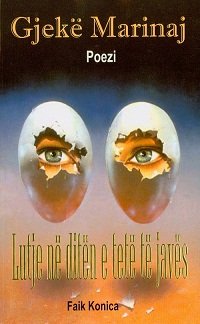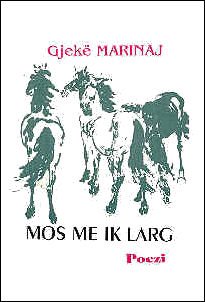Lutje në ditën e tetë të javës
ON SALE NOW
 There is a great consistency of poetic vision in Marinaj’s Lutje në ditën e tetë të javës (Prayer on the Eighth Day of the Week). Marinaj’s fans will recognize with pleasure the personal voice and elegant figurative language, both in the long and short poems that are scattered throughout the book. Here is how literary critic Ramadan Musliu puts it for the Poeteka magazine: “Gjekë Marinaj’s poems deal directly with life’s problems. They are instantaneously inspirational, at once lyrical and sensitive, clear and abstract. He reconciles these extremes by creating equilibrium between opposing ideas, contrasting imagery, and antithetical meanings. Above all, his poems are authentic, singular compositions, uniquely elegant in their motives, figurative style, poetic perception and vividness. His is a verse we must distinguish as first-rate poetry.”
There is a great consistency of poetic vision in Marinaj’s Lutje në ditën e tetë të javës (Prayer on the Eighth Day of the Week). Marinaj’s fans will recognize with pleasure the personal voice and elegant figurative language, both in the long and short poems that are scattered throughout the book. Here is how literary critic Ramadan Musliu puts it for the Poeteka magazine: “Gjekë Marinaj’s poems deal directly with life’s problems. They are instantaneously inspirational, at once lyrical and sensitive, clear and abstract. He reconciles these extremes by creating equilibrium between opposing ideas, contrasting imagery, and antithetical meanings. Above all, his poems are authentic, singular compositions, uniquely elegant in their motives, figurative style, poetic perception and vividness. His is a verse we must distinguish as first-rate poetry.”
INFINIT (Infinite)
ON SALE NOW
 Organized around hidden rhythmic principles, and on occasion making use of free verse, this is poetry that gives the reader a sense of esthetic disquiet and brings on a loss of orientation. It’s not a question of difficulty of language, since language in the verses of Gjekë Marinaj often satiates with its Baroque-like imagery and harmony. It’s rather the felt absence of a permanently stable center. Most certainly, it is not the theme of the poetry that constitutes its heart or core, but rather the subject of expression, which in the new lyrics is centered outside the personality of the author. This is the natural result of all the processes of re-embodiment and “depersonalization”, which can only invest the subject with transcendental qualities.
Organized around hidden rhythmic principles, and on occasion making use of free verse, this is poetry that gives the reader a sense of esthetic disquiet and brings on a loss of orientation. It’s not a question of difficulty of language, since language in the verses of Gjekë Marinaj often satiates with its Baroque-like imagery and harmony. It’s rather the felt absence of a permanently stable center. Most certainly, it is not the theme of the poetry that constitutes its heart or core, but rather the subject of expression, which in the new lyrics is centered outside the personality of the author. This is the natural result of all the processes of re-embodiment and “depersonalization”, which can only invest the subject with transcendental qualities.
MOS MË IK LARG
 (Do not depart for me)
(Do not depart for me)
ON SALE NOW
Do not depart for me is Marinaj’s first book of poetry. Nostalgia dominates these poems which, as a rule hark back to his vanished childhood and youth in his native land. Such are the poems, “Childhood is no longer here”, “Because one day I saw you in the Company of the Sea”, “The House in Brrut”, etc. These poems have, at their core, a simple linguistic concept. The goal aimed at is reached with a minimum of lexical tools, with the accent placed on the concept.

